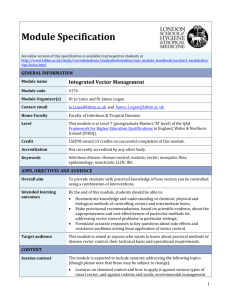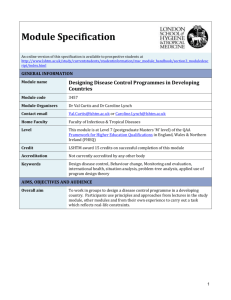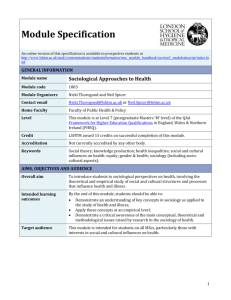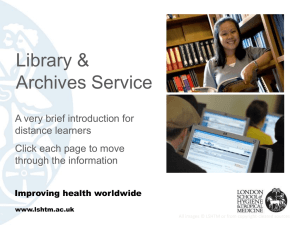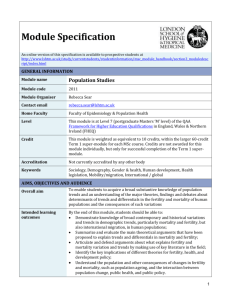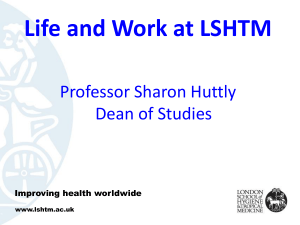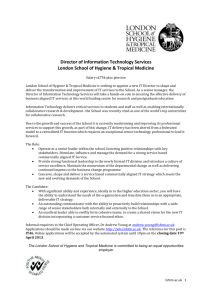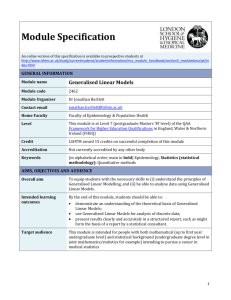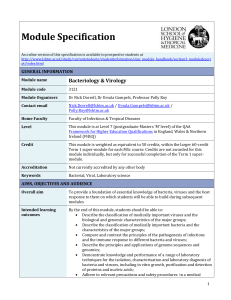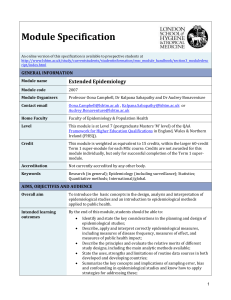3166 Vector Biology & Vector Parasite Interaction Module
advertisement
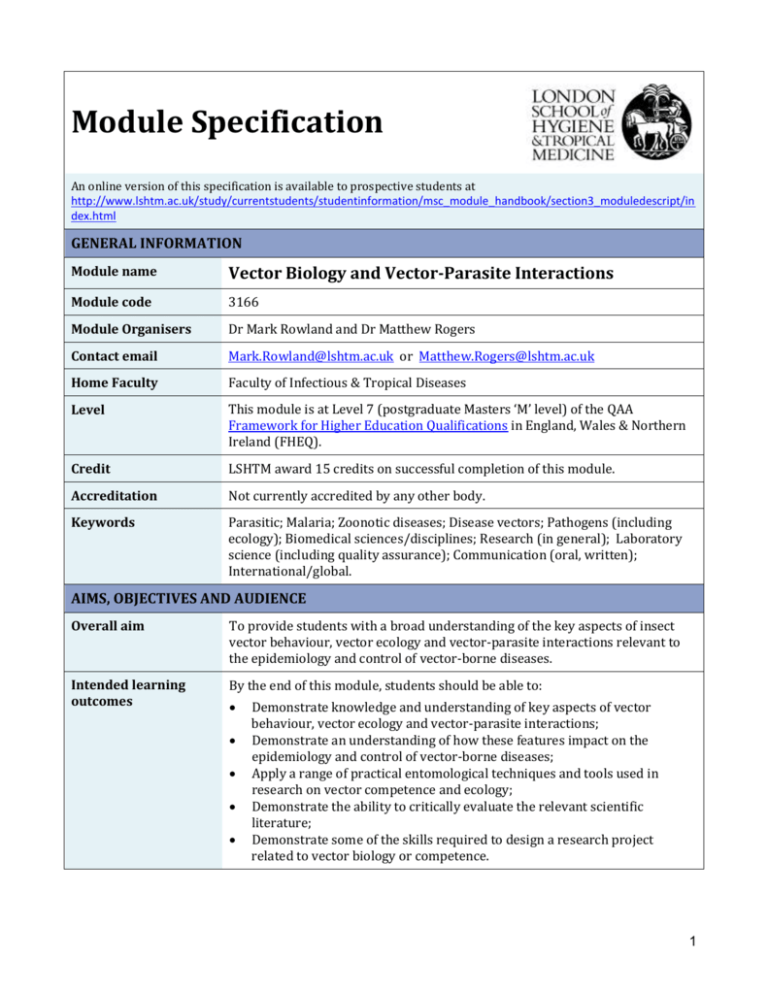
Module Specification An online version of this specification is available to prospective students at http://www.lshtm.ac.uk/study/currentstudents/studentinformation/msc_module_handbook/section3_moduledescript/in dex.html GENERAL INFORMATION Module name Vector Biology and Vector-Parasite Interactions Module code 3166 Module Organisers Dr Mark Rowland and Dr Matthew Rogers Contact email Mark.Rowland@lshtm.ac.uk or Matthew.Rogers@lshtm.ac.uk Home Faculty Faculty of Infectious & Tropical Diseases Level This module is at Level 7 (postgraduate Masters ‘M’ level) of the QAA Framework for Higher Education Qualifications in England, Wales & Northern Ireland (FHEQ). Credit LSHTM award 15 credits on successful completion of this module. Accreditation Not currently accredited by any other body. Keywords Parasitic; Malaria; Zoonotic diseases; Disease vectors; Pathogens (including ecology); Biomedical sciences/disciplines; Research (in general); Laboratory science (including quality assurance); Communication (oral, written); International/global. AIMS, OBJECTIVES AND AUDIENCE Overall aim To provide students with a broad understanding of the key aspects of insect vector behaviour, vector ecology and vector-parasite interactions relevant to the epidemiology and control of vector-borne diseases. Intended learning outcomes By the end of this module, students should be able to: Demonstrate knowledge and understanding of key aspects of vector behaviour, vector ecology and vector-parasite interactions; Demonstrate an understanding of how these features impact on the epidemiology and control of vector-borne diseases; Apply a range of practical entomological techniques and tools used in research on vector competence and ecology; Demonstrate the ability to critically evaluate the relevant scientific literature; Demonstrate some of the skills required to design a research project related to vector biology or competence. 1 Target audience This module is intended primarily for entomologists and parasitologists who wish to develop an active research interest in this discipline in field or laboratory, or apply it within the context of a control programme. CONTENT Session content The module is expected to include sessions addressing the following topics (though please note that these may be subject to change): Vector nutrition; Blood-feeding behaviour; Host seeking and selection; Anthropophily and zoophily; Endophily-exophily; Sugar feeding behaviour; Dispersal and learning; Sexual (mating) behaviour and pheromones; Vector saliva; Larval competition; Serology; Seasonality and diapause; Circadian activity rhythms and the gonotrophic cycle; Genetic and physiological determinants of vector competence and vectorparasite specificity; Effects of parasites on vector behaviour, survival and parasite transmission; Host-parasite interactions with reference to mosquitoes and Plasmodium, sandflies and Leishmania, blackflies and Onchocerca, ticks and viral pathogens. TEACHING, LEARNING AND ASSESSMENT Study resources provided or required Outline materials, handbooks, and scientific papers will be provided to students. Teaching and learning methods Teaching will include formal lectures by specialists in each field, many with associated laboratory practicals; small group work for developing research proposals on selected topics related to the course. Visits will be made to research institutions working on vector behaviour and host-parasite interactions. Assessment details Short test of multiple choice questions on the module (33%); written presentation of a research proposal in the form suitable to submit to a named grant funding agency (67%). For students who are required to re-sit, or granted a deferral or new attempt, the tasks will be a multiple choice test (based on reserve questions) and to produce a new project proposal on a different subject. 2 Assessment dates Assessment dates TBC. For students who are required to re-sit, or granted a deferral or new attempt, the next assessment date will be the standard School-recommended date in mid/late September 2016. Language of study and assessment English (please see ‘English language requirements’ below regarding the standard required for entry). TIMING AND MODE OF STUDY Duration The module runs for 5 weeks at 2.5 days per week, from Wednesday lunchtime to Friday afternoon. Dates For 2015-16, the module will start on Wednesday 24 February 2015 and finish on Friday 25 March 2016. Timetable slot The module runs in LSHTM timetable slot D2. Mode of Study The module is taught face-to-face in London. Both full-time and part-time students follow the same schedule. For full-time students, other LSHTM modules are available in the other half of the week for the C and D slots. Learning time The notional learning time for the module totals 150 hours, consisting of: Contact time ≈ 40 hours Directed self-study ≈ 30 hours Self-directed learning ≈ 40 hours Assessment, review and revision ≈ 40 hours. APPLICATION, ADMISSION AND FEES Pre-requisites Some basic knowledge is assumed (e.g. contents of Parasitology and Entomology (3122) in term 1). English language requirements A strong command of the English language is necessary to benefit from studying the module. Applicants whose first language is not English or whose prior university studies have not been conducted wholly in English must fulfil LSHTM’s English language requirements, with an acceptable score in an approved test taken in the two years prior to entry. Applicants may be asked to take a test even if the standard conditions have been met. Student numbers Student numbers are typically 10-15 per year; numbers may be capped due to limitations in facilities or staffing. Student selection Preference will be given to LSHTM MSc students, particularly those registered for MEDiC, MP, CID, PHDC, MBID, One Health or who have taken 3122 Core Entomology and Parasitology, and LSHTM research degree students. Other applicants meeting the entry criteria will usually be offered a place in the order applications are received, until any cap on numbers is reached. Full Registration (full participation) by LSHTM research degree students is required for this module. 3 Fees For registered LSHTM MSc students, fees for the module are included within MSc fees (given on individual course prospectus pages). If registering specifically for this module, as a stand-alone short course, individual module fees will apply. Tuition fees must be paid in full before commencing the module, or by any fee deadline set by the Registry. Scholarships Scholarships are not available for individual modules. Some potential sources of funding are detailed on the LSHTM website. Admission deadlines For 2015-16: For registered LSHTM MSc students, the module choice deadline (for Term 2 and 3 modules) is Friday 20 November 2015. If registering specifically for this module, applications may be made at any time. All applications should be submitted at the latest 8 weeks prior to the start of the module. Formal registration will take place on the morning of the first day of the module. ABOUT THIS DOCUMENT This module specification applies for the academic year 2015-16. Last revised: 28 June 2014 by Mark Rowland and Matthew Rogers. Minor amendments 20 July 15 SDB London School of Hygiene & Tropical Medicine, Keppel St., London WC1E 7HT. www.lshtm.ac.uk 4
